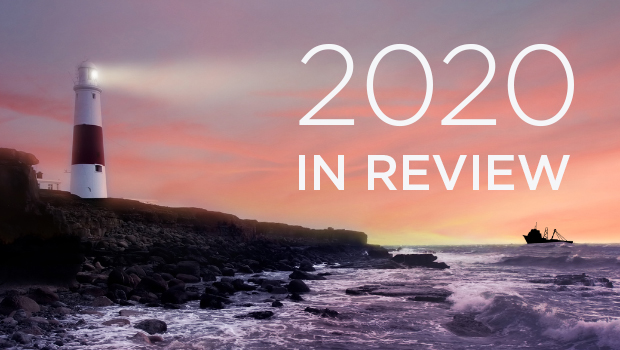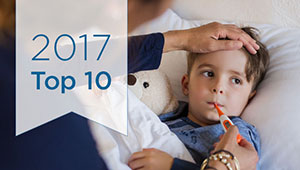10 ways we helped chart a safer passage

KPWHRI responded to the COVID-19 hurricane with actions to improve health worldwide
2020 was the year that COVID-19 took the world by storm. Looking back, we’ll remember Kaiser Permanente Washington Health Research Institute’s success at helping our country weather the pandemic while addressing a host of health care issues exacerbated by the novel coronavirus SARS-CoV-2.
KPWHRI was at the forefront of testing vaccines to ward off the disease—most notably leading the first-ever clinical trial for a COVID-19 vaccine. The institute helped to pioneer surveillance models to analyze and track how the novel coronavirus spread. We worked with colleagues in the Kaiser Permanente Washington health system to devise innovations that let patients access needed health care while limiting exposure to the virus. And we began the journey of working to become an anti-racist organization, driven by the racial disparities in pandemic health outcomes and the pervasive systemic racism spotlighted by the Black Lives Matter movement.
What follows is a quick sail through these and other advances that comprise KPWHRI’s annual list of 10 noteworthy achievements. While this is by no means a complete tally of the significant work we did in 2020, it’s a good place to start.
Developing a COVID-19 vaccine
On March 16, 2020, KPWHRI launched the world’s first trial of an investigational COVID-19 vaccine, led by Senior Investigator Lisa Jackson, MD, MPH. Preliminary results published in July show it to be safe and to have generated an immune response in participants age 18 to 55. Similar results for trial participants 55 years and older were published in September. This phase 1 clinical trial was followed by KPWHRI’s participation in a phase 3 trial of that vaccine, which by late November showed efficacy of about 94%. The institute continues to work on this and other vaccine trials.
Flattening the pandemic’s curve
Washington state was the initial epicenter for COVID-19 in the United States, and epidemiologists here played an essential role in initially slowing the spread of the disease. As a member of the Seattle Flu Study team, Michael L. Jackson, PhD, MPH, who was promoted to senior investigator in October, helped produce research showing the benefits of social distancing and created forecasting models that allowed federal and state leaders to determine what measures were needed to reduce contagion. Along with launching new studies on who is contracting the disease, he monitors annual circulation of influenza strains, which requires extra vigilance amid the COVID-19 pandemic.
Working for health equity
This year, the institute worked collaboratively to refresh our mission, vision, and values, and there was a strong consensus that working to achieve health equity for Kaiser Permanente members and all communities needs to be a central focus of our research. Our researchers looked specifically for ways to achieve greater diversity in studies, with CATALYST Scholar and Research Affiliate Magaly Ramirez offering 3 recommendations at the annual Adult Changes in Thought study symposium, and Assistant Investigator Clarissa Hsu, PhD, and Associate Investigator Karen Wernli, PhD, sharing lessons learned from their own studies in a KPWHRI Seminar, “Working towards representation in research,” introduced by Research Specialist Regan Gray, MS. As KPWHRI’s Center for Community Health and Evaluation marked its 30th anniversary, its director, Maggie Jones, MPH, posted a trenchant statement, “CCHE’s commitment to addressing systemic racism,” saying “Racism is a well-documented, well-researched public health crisis, and we at CCHE have a responsibility to speak up and be part of the solution.”
Addressing social determinants of health
Access to education, transportation, healthy food, and neighborhood amenities are among the many social-political-economic factors that have a huge effect on people’s health. In recent years, the institute has been stepping up its work on lessening the harms caused by these social factors. In October, 2 KPWHRI researchers, Katie Coleman, MSPH, and Cara Lewis, PhD, were appointed to direct cutting-edge national efforts to resolve health problems arising from social needs. As the new co-directors of the Social Needs Network for Evaluation and Translation, or SONNET, they will be leading researchers, clinicians, and providers across Kaiser Permanente to design, evaluate, and learn from initiatives that help members get assistance in these areas.
Supporting KP Washington’s rapid COVID-19 response
Over the course of 2020, our Learning Health System (LHS) Program accelerated and informed the response by Kaiser Permanente Washington (KPWA) to the pandemic. With new research evidence on COVID-19 pouring in worldwide, KPWHRI Research Associate and LHS partner Paula Blasi, MPH, conducted daily literature scans to keep health system leaders up to date on the latest, high-quality data. And in the early days of the pandemic, the LHS Program developed predictive models that enabled proactive outreach to thousands of high-risk members. As the pandemic unfolded, the LHS Program provided expert guidance to Kaiser Permanente Washington on how telehealth and other virtual care methods can best serve members. Katie Coleman, MSPH, LHS director, describes this effort, which builds on work she and KPWA colleagues did pre-pandemic to help design 2 new clinics in Seattle.
Advancing opioid management during the pandemic
At least 1 in 10 Americans suffer chronic pain that limits life and work activities. KPWHRI has been on the vanguard of efforts to find better ways to manage pain that can serve as viable alternatives to opioids. Building on more than a decade of research in this area, 3 KPWHRI senior investigators, Lynn DeBar, PhD, MPH, Katharine A. Bradley, MD, MPH, and Karen J. Sherman, PhD, MPH, are leading large National Institutes of Health-funded randomized controlled trials of pain management interventions, including those particularly suitable for telemedicine. In addition, the LHS Program developed 2 new tools now being used in KPWA primary care to help ensure high-quality treatment for opioid use disorder and facilitate use of the lifesaving treatment buprenorphine.
Improving breast cancer screening
Improving prevention and reducing risk of breast cancer depends, in part, on women getting the appropriate diagnostic testing. Two papers in 2020 from KPWHRI researchers showed how particular imaging methods could be used better with certain groups of women. One study, led by Associate Investigator Karen Wernli, PhD, and published in Cancer, found that younger women with versions of BRCA genes that increase breast cancer risk, who would benefit significantly from imaging by MRI, were not receiving it. Another study, co-led by Assistant Investigator Yates Coley, PhD, and published in JAMA Network Open, found that women with dense breasts, unlike other women, received no better cancer detection from digital breast tomosynthesis (DBT, also called 3D mammography) than from standard mammography.
Devising new tools to promote healthy aging
KPWHRI researchers presented new findings in 2020 on steps people can take to promote better health as they grow older. Associate Investigator Dori Rosenberg, PhD, MPH, and colleagues published findings in June from a randomized clinical trial showing promise for a set of measures encouraging participants to be less sedentary. Senior Investigator Eric B. Larson, MD, MPH, co-principal investigator of the KPWHRI-led Adult Changes in Thought (ACT) Study, helped to produce a new report from The Lancet Commission on dementia prevention, intervention, and care highlighting preventive measures policy makers and individuals can take to help reduce dementia risk worldwide. Leveraging resources from the ACT Study, KPWHRI also embarked on an initiative with the Allen Institute and the University of Washington to produce a high-resolution brain map of Alzheimer’s disease.
Establishing efficacy of weight-loss surgery
Adding to a series of studies that Senior Investigator David Arterburn, MD, MPH, and KPWHRI colleagues have helped to produce on bariatric surgery in recent years, the team led a study published early in 2020 showing that weight loss lasts long after bariatric surgery. This result helps to address concerns that those considering such surgery have about post-operative weight gain years later. Two other papers that Arterburn and KPWHRI researchers co-authored compared the benefits of 2 types of bariatric surgery, with one study investigating outcomes after 5 years for people with severe obesity and diabetes and the other examining which type was followed by more surgery.
Innovating new efforts in mental health research
The Mental Health Research Network, a consortium of research centers led by KPWHRI Senior Investigator Gregory Simon, MD, MPH, announced that it was nearly doubling the size of the population for its studies to 30 million. In an interview, Dr. Simon detailed how a new round of $10 million in National Institute of Mental Health funding would enable MRHN researchers to pursue studies on suicide prevention, closing ethnic and racial disparities in treatment of depression, and use of mindfulness to treat depression.
To close, 2020 was a year that presented great challenges, and we made substantial advances to meet them. We thank our colleagues outside KPWHRI for their many contributions, and we look forward to continuing our work in 2021 to making a healthier, more equitable world.
By Jonathan Rabinovitz
2019 Highlights

Top ten splashes from KPWHRI in 2019
Explore 10 ways that Kaiser Permanente Washington research has advanced health and health care this year.
2018 highlights

10 ways we made a healthier world in 2018
Kaiser Permanente Washington research tackled problems like obesity, suicide—and care that doesn’t promote health.
2017 highlights

Top 10 stories of our science from 2017
Efforts to improve flu prediction, vaccine awareness, cancer screening, and back pain treatment were among KPWHRI’s most compelling stories last year.




